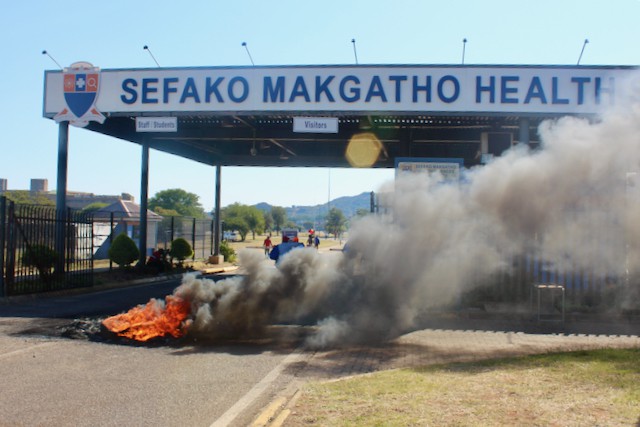Strike at Sefako Makgatho Health Sciences University enters second week
NEHAWU is demanding a 6% pay increase; management initially offered 3.5%
Activities at Sefako Makgatho Health Sciences University remain suspended as workers burn tyres at the entrance and strike for a 6% pay increase. Photo: Mosima Rafapa
A strike by over 300 workers at Sefako Makgatho Health Sciences University (SMU) in Ga-Rankuwa, Pretoria, has entered its second week, disrupting the academic programme.
The workers, affiliated to the National Health Education & Allied Workers Union (NEHAWU) downed tools on Monday last week. They were demanding a 6% pay increase, while management had offered 3.5%. In a memorandum last Thursday, they also demanded a once-off payment of R2,500.
SMU NEHAWU chairperson Mulaudzi Tshifhiwa said that Vice Chancellor Professor Peter Mbati had on Saturday created the wrong impression that the union had accepted a 4% increase.
“We have not even deliberated on the offer,” said Tshifhiwa.
Workers started burning tyres at the university’s entrance last week Tuesday. They were still burning tyres on Monday morning – proof that the workers had not agreed to 4% said Tshifhiwa.
“We are not going back to work. Last week was just a warm up. Comrades, we are not going to back down,” SMU worker Tshepo Lechaba told the strikers.
Addressing workers on Friday, Nehawu deputy chairperson Themba Khumalo said management needed to also attend to the demands of students.
SRC President Thato Maseko confirmed that a memorandum of demands was submitted over the weekend. Issues include renovations of student residences, the implementation of a Gender Based Violence policy and the establishment of the Gender Equity Office.”
Dr Eric Pule, spokesperson of SMU, did not respond to our request for comment.
Support independent journalism
Donate using Payfast

Don't miss out on the latest news
We respect your privacy, and promise we won't spam you.
Next: Johannesburg garbage removal: reclaimers relieved that Pikitup’s R50 levy has been withdrawn
Previous: Learners sent home as taps run dry at Eastern Cape schools
© 2021 GroundUp. This article is licensed under a Creative Commons Attribution-NoDerivatives 4.0 International License.
You may republish this article, so long as you credit the authors and GroundUp, and do not change the text. Please include a link back to the original article.
We put an invisible pixel in the article so that we can count traffic to republishers. All analytics tools are solely on our servers. We do not give our logs to any third party. Logs are deleted after two weeks. We do not use any IP address identifying information except to count regional traffic. We are solely interested in counting hits, not tracking users. If you republish, please do not delete the invisible pixel.

